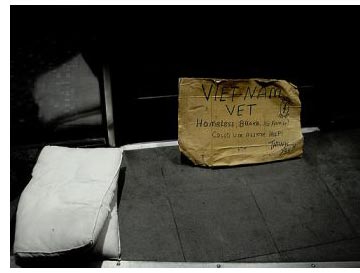The fight of their lives
February 17, 2011
 It’s hard to imagine a day when thousands of the homeless people on our streets were spit-and-polish members of the armed services, dispatched to points across the nation and throughout the world. Now, here they are in Los Angeles, an estimated 7,000 of our former troops, waging a war of survival.
It’s hard to imagine a day when thousands of the homeless people on our streets were spit-and-polish members of the armed services, dispatched to points across the nation and throughout the world. Now, here they are in Los Angeles, an estimated 7,000 of our former troops, waging a war of survival.
These men and women are no longer symbols of our military might; they are evidence of our shameful failure to protect them at home.
In interviews with outreach workers, they tell of lives plagued by sickness and despair. They’ve been stricken with everything from heart disease to tuberculosis to Hepatitis C and cancer. They’ve battled the demons of alcoholism and addiction. They’ve suffered assaults on the streets and been hospitalized and jailed numerous times—an expense that falls squarely on the public.
Help, however, is on the way.
On Wednesday, the Department of Veterans Affairs and a collection of federal, state and local agencies announced the creation of Veterans to Home, Project 60, a program aimed at providing permanent housing and support services to 60 veterans who’ve been identified as the most likely to die on the streets. It’s a modest but monumental step forward.
The veterans’ program is modeled after Project 50, an effort I’ve championed to provide permanent supportive housing to 50 of Skid Row’s most vulnerable and chronically homeless individuals.
The concept, taking root in cities across the country, is that if you first give a person a permanent home, then they’ll be far more likely to take advantage of the services made available to them, including health and mental health help. Taxpayers, in turn, will be spared the enormous costs of hospitalizations and incarceration.
Project 50 has demonstrated that the concept works.
The truth is that a concerted effort like this for our struggling veterans was long overdue. These kinds of homeless programs require immense cross-jurisdictional cooperation, something that isn’t a hallmark of government. But in this case, the cause has trumped the rivalries.
I salute Veterans Affairs for rising to the challenge, providing much needed housing vouchers, as well as the services of mental health and substance abuse experts.
The agency has tremendous resources, far more than any county in the country and far more than any nonprofit. If the VA becomes convinced that this is the way to solve veteran homelessness, then a tsunami of housing and services could follow for a significant slice of our homeless population.
I’d also like to thank our four private partners in this effort who have been in the forefront of the “housing first” movement—OPCC, Step Up on Second, St. Joseph Center and San Fernando Valley Community Mental Health Center. These organizations are supplying housing for the veterans and sharing their expertise with federal officials.
So next November, on Veterans Day, I know that I’ll not only be remembering those we’ve lost to battle but also those enduring a living hell on our streets in Los Angeles.
For more on this effort, here’s a column by Los Angeles Times columnist Steve Lopez and an editorial that recently appeared in The New York Times.
Posted 2/17/11












 405 bridge work causes a stink
405 bridge work causes a stink





